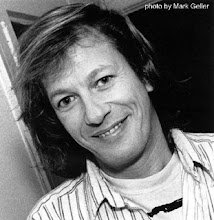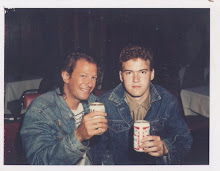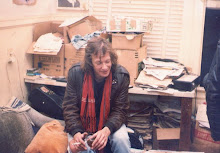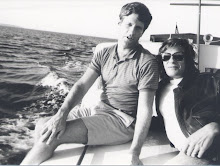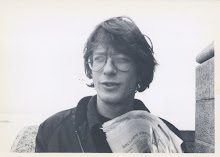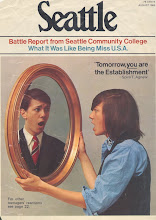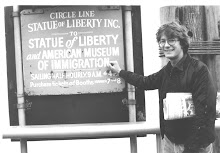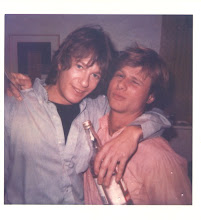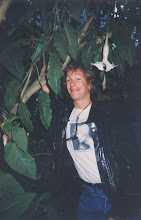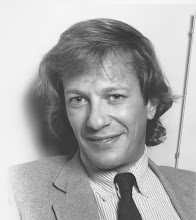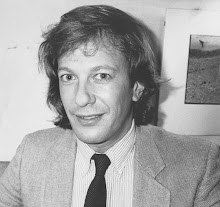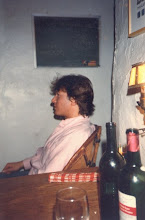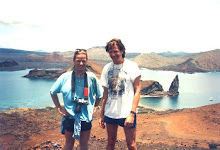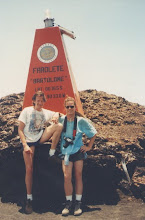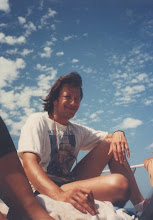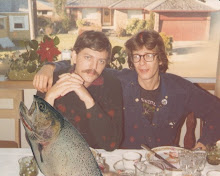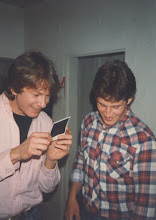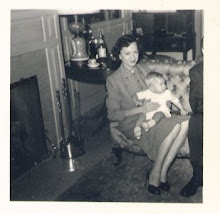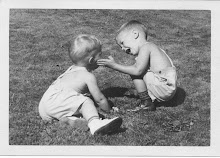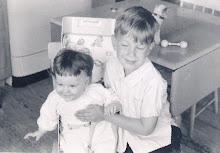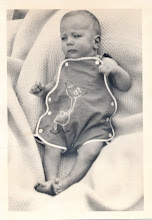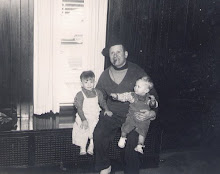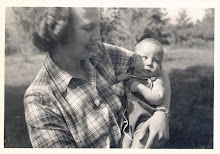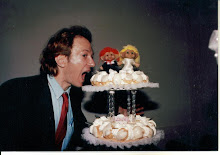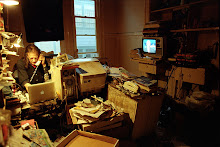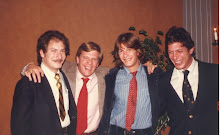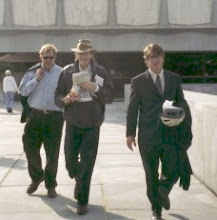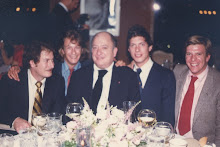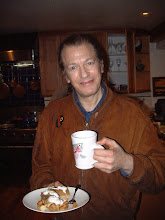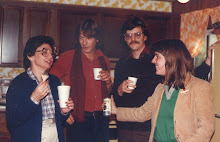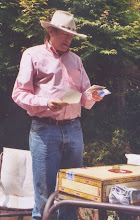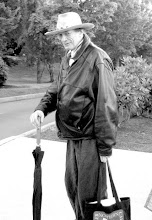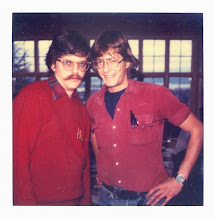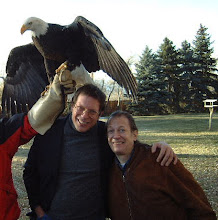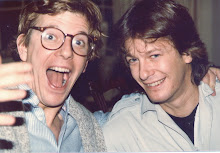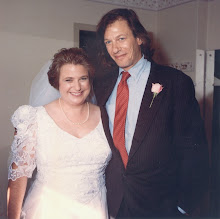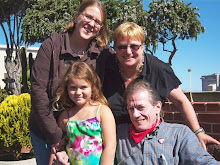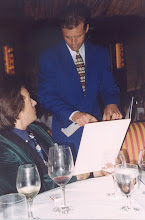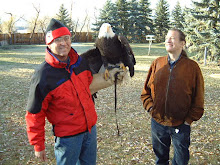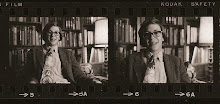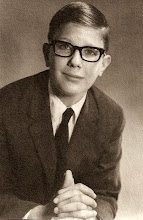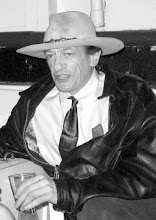I am a friend of Larry-bob's and am co-founder of The Queer Zine Archive Project. I read a post at queerpunks.com written by Larry about Adam's passing. It was a random coincidence that in November 2007 I had written about Adam's articles on queer zines from The Advocate. My article appeared in the Milwaukee, Wisconsin based Queer Life News which has limited circulation in the Milwaukee and Madison metro areas as well as other parts of the state.
for article go to
http://adamblockwritings.blogspot.com/2008/03/qzines-by-christopher-wilde.html
I will be publishing this and my other queer zine articles in a book at some point later this year. I would love for other fans of Adam's to read my article and learn about his important contribution to the history of queer zines.
Christopher WildeCo-
Founder
The Queer Zine Archive Project (QZAP)
http://www.qzap.org/
Sunday, March 16, 2008
Friday, March 14, 2008
Photo from Brook Dillon

Entrenched - by Brook Dillon
San Francisco 1997
I like this image and there are many more from that day. I came over to clean, fighting to recycle every New York Times (and sneaking others into the recycling bag, evil), and my payment to myself was bringing my camera and tripod and photographing Adam and a fair amount of his flat. I didn't do this to shame Adam, but to honor the reality of it, for better, Adam's grand appreciation of culture, and worse, Adam overwhelmed by all that combined with his addictions. I knew Adam for 18 years and went thru many ups and downs with him and loved him dearly and I'm a photographer, it's my art and a passion, so I felt allowed, and Adam didn't stop me, though he was so obsessively reading and talking on the phone that he hardly payed any attention to my endeavor.
from Thor Anderson
Cambridge, Massachusetts, 1975
"Now, this is a fine piece of horse manure!" Adam waved a draft chapter of my senior thesis under my nose. "Only fine?" I gave him a look, and was rewarded with a lop-sided grin. "Well, whoever heard of a bunch of Indians wearing cowboy hats! I'm sure that they could do better than that. Didn't you say they're Mayans? It seems to me" "Adam." "they're not taking their Native American heritage very seriously!" "Adam." "You say here that they wear plastic cowboy hats! Good Lord." "Adam, I'll be sure to pass that on next time I'm there. Better yet, you should tell them." "Well, someone's got to tell them!" The image of Adam Block presenting a fashion statement to a village of Maya Indians in the highlands of Chiapas flashed before my mind, and I knew that he was fully capable of showing up with just such a mission in mind. "So, how about the writing?" He waved a hand. "It needs some work." We set out to page through the manuscript.
Switzerland, 1985
It was well into Spring, but mounds of heavy snow persisted in drifts and piles as we made our way to a tiny, over-heated bar. It was bustling with locals from neighboring alpine villages. In short order Adam provisioned us, and then sought out the cutest boy in the establishment. Soon he was holding forth at the far end of the bar, communicating through a smattering of French, English, Swiss German, and alcohol. He probably mentioned our audience with Pope John Paul, perhaps without emphasizing that we were amongst thousands receiving His Easter benediction. Somehow the evening concluded with Adam's young friend eating his wine glass, right down to the stem. I don't really know how this came to pass, but I do remember Adam's infinite delight-- in the moment, in spectacle, and at life's ever-unfolding absurdities.
San Francisco, 1995
"Adam, there's a newspaper on the stove." "Could you please not move anything!"
San Leandro, 2007
"We have got to make this movie! Wait. Ahhh. Uhhh. Let me catch my breath. I was surrounded by chanting rabbis, but they were actually rat-people." "Adam, I think that was us around your bed, trying to bring you back." "Hum. But now, you've got to be here when this chimney blows. It's like an atomic reactor or something. It's unbelievable. And the people here. They keep changing, and no one speaks English! They're all born-again Christians. I tell them that when they get swept up into heaven in the rapture, this atheist Jew-boy isn't going anywhere, and there had better be someone here to help me." For some reason Adam intones the last phrase with a gentle Texan twang.
San Francisco, 2007
"I realize that I don't really have anything more to do here. I know I'm a handful, and I don't want to just hang around. Lord knows, that's the last thing I want." The same lop-sided grin, this time with a wide-eyed glance over my shoulder. After fussing with the humidifier, I took my leave. "Give my love to Consuela and the girls." My wife of twenty years is named Consuelo, but I gave up correcting Adam long ago. "I love you Adam." "I know."
Thor Anderson, San Francisco
"Now, this is a fine piece of horse manure!" Adam waved a draft chapter of my senior thesis under my nose. "Only fine?" I gave him a look, and was rewarded with a lop-sided grin. "Well, whoever heard of a bunch of Indians wearing cowboy hats! I'm sure that they could do better than that. Didn't you say they're Mayans? It seems to me" "Adam." "they're not taking their Native American heritage very seriously!" "Adam." "You say here that they wear plastic cowboy hats! Good Lord." "Adam, I'll be sure to pass that on next time I'm there. Better yet, you should tell them." "Well, someone's got to tell them!" The image of Adam Block presenting a fashion statement to a village of Maya Indians in the highlands of Chiapas flashed before my mind, and I knew that he was fully capable of showing up with just such a mission in mind. "So, how about the writing?" He waved a hand. "It needs some work." We set out to page through the manuscript.
Switzerland, 1985
It was well into Spring, but mounds of heavy snow persisted in drifts and piles as we made our way to a tiny, over-heated bar. It was bustling with locals from neighboring alpine villages. In short order Adam provisioned us, and then sought out the cutest boy in the establishment. Soon he was holding forth at the far end of the bar, communicating through a smattering of French, English, Swiss German, and alcohol. He probably mentioned our audience with Pope John Paul, perhaps without emphasizing that we were amongst thousands receiving His Easter benediction. Somehow the evening concluded with Adam's young friend eating his wine glass, right down to the stem. I don't really know how this came to pass, but I do remember Adam's infinite delight-- in the moment, in spectacle, and at life's ever-unfolding absurdities.
San Francisco, 1995
"Adam, there's a newspaper on the stove." "Could you please not move anything!"
San Leandro, 2007
"We have got to make this movie! Wait. Ahhh. Uhhh. Let me catch my breath. I was surrounded by chanting rabbis, but they were actually rat-people." "Adam, I think that was us around your bed, trying to bring you back." "Hum. But now, you've got to be here when this chimney blows. It's like an atomic reactor or something. It's unbelievable. And the people here. They keep changing, and no one speaks English! They're all born-again Christians. I tell them that when they get swept up into heaven in the rapture, this atheist Jew-boy isn't going anywhere, and there had better be someone here to help me." For some reason Adam intones the last phrase with a gentle Texan twang.
San Francisco, 2007
"I realize that I don't really have anything more to do here. I know I'm a handful, and I don't want to just hang around. Lord knows, that's the last thing I want." The same lop-sided grin, this time with a wide-eyed glance over my shoulder. After fussing with the humidifier, I took my leave. "Give my love to Consuela and the girls." My wife of twenty years is named Consuelo, but I gave up correcting Adam long ago. "I love you Adam." "I know."
Thor Anderson, San Francisco
Wednesday, March 12, 2008
from Hayne Bayless
I have a distinct memory of Adam at a party at your house in the early 60s. We kids had sequestered ourselves in a room away from the parents to listen to something called rock 'n' roll on the record player. Adam was MC. At one point he leapt up saying, "Now watch this, this is the Twist!" Grinning, he proceeded to dance. It shocked me just as I imagine Elvis' debut shocked Ed Sullivan's audience. But what I recall most fondly was Adam's sheer joy at his own audacity.
Sunday, March 9, 2008
Eulogy from Kenan Block
Adam’s Memorial Service----March 6, 2008---Temple De Hirsch, Seattle
Remarks by Kenan Block, Adam’s younger brother.
Adam, Adam, Adam. There was no person in my life who could make me laugh harder, make me angry and frustrated for long periods, or who taught me more than my big brother.
Adam was a remarkable older brother, the best man at my wedding and often, my best friend. He was someone I loved and to paraphrase Woody Allan, I idolized all out of proportion.
Adam cared about injustice and would generally side with the underdog. My memories of him include my first day of first grade at Stevens Elementary when Adam found me in the crowded cafeteria at lunch to check how I was doing. Later that same year he woke me at dawn to watch the first American space launch.
I remember around age 9, Adam challenging me at the dinner table one night to prove the earth was in fact round. Every seemingly sensible argument I offered faced a tough rebut---How did I know all the photographs from space were not fakes?---and the least acceptable response to Adam was my saying that my teacher had told me so.
One day when I was 12, Adam told us about this amazing new band from England we had never heard of before---The Beatles and he insisting we watch them for those 4 weeks they were on The Ed Sullivan Show.
Adam was always recommending books, music and movies. His advice trumped any teachers. At 12 Adam had me reading “Cather in the Rye” and for years to follow he would take me and other siblings to the University Book Store to buy us a stacks of paperbacks that we had to read---from Anis Nin to Kurt Vonnegut and Ken Kesey.
Adam was born with chutzpa. He was 11 during the 1962 Seattle World’s Fair and would constantly take our father’s gold pass to get in. He loved meeting the famous. So when John Glenn visited the Fair, Adam put on his blue Brooks Brothers blazer and snuck into the Space Needle elevator with the superstar astronaut and his entourage. Adam carried himself as though he belonged so everyone just assumed he was the son of some VIP as he followed the group around.
Adam liked being the center of attention and never seemed to mind that he constantly made everyone wait for him. By the time he was in college Adam had earned a fitting nickname from our father that would continue through adulthood---“His Lordship”.
Perhaps most important of all---Adam had a curiosity and a dose of fearlessness about experiencing life and the world on many levels and dragging anyone who was with him along for the adventure. It was at times maddening---at times embarrassing---but never dull. And no one was safe from being interrogated by Adam---or being offered advice.
On one of our periodic expeditions, we found ourselves on the strange tourist island of Freeport in the Bahamas---I think it had to do with a Pan Am $99 dollar roundtrip promotional fare that we couldn’t pass up---a 3 day lark. Adam had a young boyfriend in tow as he often did. After landing we grabbed a cab at the airport and Adam began interviewing our driver who had the unforgettable name Simeon Wildgoose…after a through interrogation we found out what the locals really do---like going to the visiting Third World carnival that was in town. Adam insisted we go---an adventure that included an actual freak show with adult Siamese twins that we viewed for 75 cents. On that same trip, Adam got Simeon to set up a private visit to his cousin’s coconut rum factory. Over the years Adam would affectionately invoke the name of Simeon Wildgoose.
In the mid-eighties, on a trip to New Orleans we joined some friends with a rental car. Adam had scouted out a bayou backwoods day trip that took us to a diner in Baton Rouge that invented the fried chicken salad, then off to a tiny town with a legendary instrument store that was famous for making guitars and squeeze boxes. Next, just winging it, Adam directed us down a long dirt road where he found a young Cajun boy who he talked into taking us out on his rickety motor boat for a tour of the bayou that was right out of Tennessee Williams.
Then there was going to restaurants with Adam. First came Adam’s preliminary research to make sure we were eating at the most interesting place in town. No matter how fancy the restaurant, after getting menus, Adam would rise and wander table to table to inspect the food folks had ordered and interrogate them about how it tasted. All of us in Adam’s party would do our best to pretend we had no association with this rude character---but of course Adam would return with great insights allowing us to place our orders based on his shameless reconnaissance.
For anyone in Adam’s orbit there was his constant questioning and unsolicited advice. What was particularly maddening---with his remarkable thirst for information and his stunning memory, Adam often knew more about a given topic than the “expert” he was talking to and advising.
During the many years I worked at what was then The MacNeil-Lehrer NewsHour Adam would bully me about the boring, centrist guests we had on the air. With great frequency Adam berated me for failing to get the likes of Michael Moore and Noam Chomsky on the NewsHour as regulars.
I may not have gotten Michel Moore on the NewsHour---but in part because of Adam I did get folks like Molly Ivins to become regulars.
There are too many stories and memories. But in full candor during the last ten years or so, dealing with Adam increasingly became a struggle. As his health started to fail, he stopped his freelance writing and became even more self absorbed, combative and angry. The phone ringing after midnight was almost certainly Adam, who would be leave me an annoyed message because I wasn’t awake and waiting to listen to him carry on for an hour or two. The notion of working during the day and sleeping at night were bourgeois rituals to Adam.
But through it all, Adam had a truly remarkable group of loyal and loving pals who put up with him, tried to be of help and tolerated Adam’s constant second guessing of any effort to help.
Adam did finally manage to die peacefully at home and on his own terms. I and others were in the process of moving him up to Seattle to Bailey-Boushay House, but clearly Adam didn’t want to leave. San Francisco had truly become Adam’s home and he got live out his life in that city he’d so come to love.
There was one tragedy of the timing of Adam’s death---it was just days before the California Presidential primary and we had failed to get him an absentee ballot to so he could cast his vote for Barack Obama.
Wherever Adam is now, I hope he is at peace, but I am confident of one thing--- he is not giving any peace to those who are with him.
Remarks by Kenan Block, Adam’s younger brother.
Adam, Adam, Adam. There was no person in my life who could make me laugh harder, make me angry and frustrated for long periods, or who taught me more than my big brother.
Adam was a remarkable older brother, the best man at my wedding and often, my best friend. He was someone I loved and to paraphrase Woody Allan, I idolized all out of proportion.
Adam cared about injustice and would generally side with the underdog. My memories of him include my first day of first grade at Stevens Elementary when Adam found me in the crowded cafeteria at lunch to check how I was doing. Later that same year he woke me at dawn to watch the first American space launch.
I remember around age 9, Adam challenging me at the dinner table one night to prove the earth was in fact round. Every seemingly sensible argument I offered faced a tough rebut---How did I know all the photographs from space were not fakes?---and the least acceptable response to Adam was my saying that my teacher had told me so.
One day when I was 12, Adam told us about this amazing new band from England we had never heard of before---The Beatles and he insisting we watch them for those 4 weeks they were on The Ed Sullivan Show.
Adam was always recommending books, music and movies. His advice trumped any teachers. At 12 Adam had me reading “Cather in the Rye” and for years to follow he would take me and other siblings to the University Book Store to buy us a stacks of paperbacks that we had to read---from Anis Nin to Kurt Vonnegut and Ken Kesey.
Adam was born with chutzpa. He was 11 during the 1962 Seattle World’s Fair and would constantly take our father’s gold pass to get in. He loved meeting the famous. So when John Glenn visited the Fair, Adam put on his blue Brooks Brothers blazer and snuck into the Space Needle elevator with the superstar astronaut and his entourage. Adam carried himself as though he belonged so everyone just assumed he was the son of some VIP as he followed the group around.
Adam liked being the center of attention and never seemed to mind that he constantly made everyone wait for him. By the time he was in college Adam had earned a fitting nickname from our father that would continue through adulthood---“His Lordship”.
Perhaps most important of all---Adam had a curiosity and a dose of fearlessness about experiencing life and the world on many levels and dragging anyone who was with him along for the adventure. It was at times maddening---at times embarrassing---but never dull. And no one was safe from being interrogated by Adam---or being offered advice.
On one of our periodic expeditions, we found ourselves on the strange tourist island of Freeport in the Bahamas---I think it had to do with a Pan Am $99 dollar roundtrip promotional fare that we couldn’t pass up---a 3 day lark. Adam had a young boyfriend in tow as he often did. After landing we grabbed a cab at the airport and Adam began interviewing our driver who had the unforgettable name Simeon Wildgoose…after a through interrogation we found out what the locals really do---like going to the visiting Third World carnival that was in town. Adam insisted we go---an adventure that included an actual freak show with adult Siamese twins that we viewed for 75 cents. On that same trip, Adam got Simeon to set up a private visit to his cousin’s coconut rum factory. Over the years Adam would affectionately invoke the name of Simeon Wildgoose.
In the mid-eighties, on a trip to New Orleans we joined some friends with a rental car. Adam had scouted out a bayou backwoods day trip that took us to a diner in Baton Rouge that invented the fried chicken salad, then off to a tiny town with a legendary instrument store that was famous for making guitars and squeeze boxes. Next, just winging it, Adam directed us down a long dirt road where he found a young Cajun boy who he talked into taking us out on his rickety motor boat for a tour of the bayou that was right out of Tennessee Williams.
Then there was going to restaurants with Adam. First came Adam’s preliminary research to make sure we were eating at the most interesting place in town. No matter how fancy the restaurant, after getting menus, Adam would rise and wander table to table to inspect the food folks had ordered and interrogate them about how it tasted. All of us in Adam’s party would do our best to pretend we had no association with this rude character---but of course Adam would return with great insights allowing us to place our orders based on his shameless reconnaissance.
For anyone in Adam’s orbit there was his constant questioning and unsolicited advice. What was particularly maddening---with his remarkable thirst for information and his stunning memory, Adam often knew more about a given topic than the “expert” he was talking to and advising.
During the many years I worked at what was then The MacNeil-Lehrer NewsHour Adam would bully me about the boring, centrist guests we had on the air. With great frequency Adam berated me for failing to get the likes of Michael Moore and Noam Chomsky on the NewsHour as regulars.
I may not have gotten Michel Moore on the NewsHour---but in part because of Adam I did get folks like Molly Ivins to become regulars.
There are too many stories and memories. But in full candor during the last ten years or so, dealing with Adam increasingly became a struggle. As his health started to fail, he stopped his freelance writing and became even more self absorbed, combative and angry. The phone ringing after midnight was almost certainly Adam, who would be leave me an annoyed message because I wasn’t awake and waiting to listen to him carry on for an hour or two. The notion of working during the day and sleeping at night were bourgeois rituals to Adam.
But through it all, Adam had a truly remarkable group of loyal and loving pals who put up with him, tried to be of help and tolerated Adam’s constant second guessing of any effort to help.
Adam did finally manage to die peacefully at home and on his own terms. I and others were in the process of moving him up to Seattle to Bailey-Boushay House, but clearly Adam didn’t want to leave. San Francisco had truly become Adam’s home and he got live out his life in that city he’d so come to love.
There was one tragedy of the timing of Adam’s death---it was just days before the California Presidential primary and we had failed to get him an absentee ballot to so he could cast his vote for Barack Obama.
Wherever Adam is now, I hope he is at peace, but I am confident of one thing--- he is not giving any peace to those who are with him.
from Jonathan Block -When Death Comes
by Mary Oliver
When death comes
like the hungry bear in autumn;
when death comes and takes all the bright coins from his purse
to buy me, and snaps the purse shut;
when death comes
like the measle-pox;
when death comes
like an iceberg between the shoulder blades,
I want to step through the door full of curiosity,
wondering: what is it going to be like, that cottage of darkness?
And therefore I look upon everything
as a brotherhood and a sisterhood,
and I look upon time as no more than an idea,
and I consider eternity as another possibility,
and I think of each life as a flower as common
as a field daisy, and as singular,
and each name a comfortable music in the mouth,
tending, as all music does, toward silence,
and each body a lion of courage, and something
precious to the earth.
When it's over, I want to say: all my life
I was a bride married to amazement.
I was the bridegroom, taking the world into my arms.
When it's over, I don't want to wonder
if I have made of my life something particular, and real.
I don't want to find myself sighing and frightened,
or full of argument.
I don't want to end up having simply visited this world.
When death comes
like the hungry bear in autumn;
when death comes and takes all the bright coins from his purse
to buy me, and snaps the purse shut;
when death comes
like the measle-pox;
when death comes
like an iceberg between the shoulder blades,
I want to step through the door full of curiosity,
wondering: what is it going to be like, that cottage of darkness?
And therefore I look upon everything
as a brotherhood and a sisterhood,
and I look upon time as no more than an idea,
and I consider eternity as another possibility,
and I think of each life as a flower as common
as a field daisy, and as singular,
and each name a comfortable music in the mouth,
tending, as all music does, toward silence,
and each body a lion of courage, and something
precious to the earth.
When it's over, I want to say: all my life
I was a bride married to amazement.
I was the bridegroom, taking the world into my arms.
When it's over, I don't want to wonder
if I have made of my life something particular, and real.
I don't want to find myself sighing and frightened,
or full of argument.
I don't want to end up having simply visited this world.
Friday, March 7, 2008
Eulogy from Jill Bullitt
Adam’s Memorial Service----March 6, 2008
Temple De Hirsch, Seattle
I was recently reading Adam’s Salon Magazine commentary on a 1995 Bruce Springsteen concert in Berkeley. In it, Adam suggests that “the Boss” watch the Preston Sturges' film, “ Sullivan’s Travels’” to learn how to stop impersonating the misery of those he sings about (now that he’s so rich) and to worry more about entertaining them, instead. In “Sullivan’s Travels”, Adam says: “Joel McCrea plays a successful Hollywood director of screwball comedies who feels compelled by the Depression to make a serious Capra-esque film about social justice. Setting off disguised as a bum, (McCrea) ends up jailed in a dismal Southern prison. At a rare screening for the prisoners, McCrea discovers that the anarchic humor of a cartoon provides the cons with glorious brief respite from their grim lives. McCrea learns first-hand that a dose of laughter and delight can offer the oppressed something they need far more than any earnest indictment of social ills.”
Anyway, when I was reading this a couple of weeks ago,I thought ”omigod, I’ve got to tell Adam about the time I snuck into the party Robert De Niro threw for Mandela right after he got out of prison and got to hear Mandela tell Eddie Murphy the exact same thing! In a case of life mimicking fiction, I saw Mandela lean over and tell Murphy how deeply important his comedies were to him at Robben Island. I couldn’t believe it, Eddie Murphy (of all people!), made continuing with daily life seem possible for Mandela and his fellow political prisoners! Since this was right after (morally craven) Murphy had made the hugely stereotypical and bigoted ”Coming to America,” I was astounded.
Of course, I had forgotten that I can’t tell Adam.
Adam and I grew up on the same street. The Block kids were smarter, funnier, naughtier, and more argumentative, than any other family we knew, and my older brother and sister and I continually sought to go play with them at their lively, boisterous house.
Right after Adam’s mother (who was also my god-mother) Dorothy, died, Adam and I started the 3rd grade together at Stevens School, here on Capitol Hill. To our dismay, we found ourselves squarely “in the peculiar world of third grade” (to paraphrase what he later told Schuyler, regarding another school) ”in which you are held prisoner by adults often less intelligent than you are.” Adam, when he discovered that our teacher, Miss Straight, was both criminally dull and moderately cruel, almost immediately made his move. And he did so in what I would call classic Adam fashion: he talked her to death. Before my eyes, he became a kind of machine-gun of humiliation for her, firing one question after another at her that she couldn’t answer. Adam skipped a grade, based on this performance, leaving me behind, to get beaten up after school and to try out a tentative 3rd grade friendship with a girl who lived near us too, until I learned her brothers were famous for shooting the legs off birds.
Although he came to visit me when I was in college in Palo Alto, and we rode around in my blue and white 1956 Buick Special; our friendship mostly took place later, in San Francisco. Starting thirty years ago or so, after I moved to New York, I would look up Adam when I came to town. We would sit in one little North Beach cafe or another and just talk, and I would show him images of my recent work. He seemed unfailingly interested in seeing what I was doing, which puzzled me, slightly, because my paintings didn’t fall within any parameters that I imagined him to be very interested in at that time. Although we had both grown up around fine examples of the work of Morris Graves and Mark Tobey, and my work was derived from a language rooted in, among other things, NW painting, I couldn’t really imagine why he would be that interested in it. Sometimes, I felt his interest came from a kind of loyalty to our shared past. But, in any event, with regard to wanting to see me and what I was up to, his interest was unfailing. Adam was family, also, in the way that your first friends with whom you share ideas become your family.
Right before my 50th birthday, Adam called me in Paris to offer to come celebrate it with us. When my husband and I were married 12 years ago, we eloped, and although we had a very nice reception a year later, we were hoping to have a real party for my 50th, for the self-selected group that would make such a journey to come play. I had mailed out scores of very colorful invitations designed by my daughter, Makaiya, who was 10, of a kitty flying over the world. The picture was one that I, the mom, considered to be an utterly charming image, one that I imagined would be impossible to turn down. We were inviting our stateside family and friends to launch into the air to us, and the invites contained an offer to put up our guests in Paris for a few days (possibly, but not necessarily on the floor of my mother’s Paris apartment) but, offering food and lodging of some sort, anyway. When Adam called, fully intending to come, I had to regretfully inform him that he was actually the only one planning to come from the States, although, as I told him, the turnout of friends from Europe would be considerably better. Unfortunately, this news dampened his enthusiasm enough to cause him to reconsider. But, how I loved him for that instinct, for his loyalty and warm heart, and for his special brand of wit and intelligence that has helped keep us all warm during the cold times.
Temple De Hirsch, Seattle
I was recently reading Adam’s Salon Magazine commentary on a 1995 Bruce Springsteen concert in Berkeley. In it, Adam suggests that “the Boss” watch the Preston Sturges' film, “ Sullivan’s Travels’” to learn how to stop impersonating the misery of those he sings about (now that he’s so rich) and to worry more about entertaining them, instead. In “Sullivan’s Travels”, Adam says: “Joel McCrea plays a successful Hollywood director of screwball comedies who feels compelled by the Depression to make a serious Capra-esque film about social justice. Setting off disguised as a bum, (McCrea) ends up jailed in a dismal Southern prison. At a rare screening for the prisoners, McCrea discovers that the anarchic humor of a cartoon provides the cons with glorious brief respite from their grim lives. McCrea learns first-hand that a dose of laughter and delight can offer the oppressed something they need far more than any earnest indictment of social ills.”
Anyway, when I was reading this a couple of weeks ago,I thought ”omigod, I’ve got to tell Adam about the time I snuck into the party Robert De Niro threw for Mandela right after he got out of prison and got to hear Mandela tell Eddie Murphy the exact same thing! In a case of life mimicking fiction, I saw Mandela lean over and tell Murphy how deeply important his comedies were to him at Robben Island. I couldn’t believe it, Eddie Murphy (of all people!), made continuing with daily life seem possible for Mandela and his fellow political prisoners! Since this was right after (morally craven) Murphy had made the hugely stereotypical and bigoted ”Coming to America,” I was astounded.
Of course, I had forgotten that I can’t tell Adam.
Adam and I grew up on the same street. The Block kids were smarter, funnier, naughtier, and more argumentative, than any other family we knew, and my older brother and sister and I continually sought to go play with them at their lively, boisterous house.
Right after Adam’s mother (who was also my god-mother) Dorothy, died, Adam and I started the 3rd grade together at Stevens School, here on Capitol Hill. To our dismay, we found ourselves squarely “in the peculiar world of third grade” (to paraphrase what he later told Schuyler, regarding another school) ”in which you are held prisoner by adults often less intelligent than you are.” Adam, when he discovered that our teacher, Miss Straight, was both criminally dull and moderately cruel, almost immediately made his move. And he did so in what I would call classic Adam fashion: he talked her to death. Before my eyes, he became a kind of machine-gun of humiliation for her, firing one question after another at her that she couldn’t answer. Adam skipped a grade, based on this performance, leaving me behind, to get beaten up after school and to try out a tentative 3rd grade friendship with a girl who lived near us too, until I learned her brothers were famous for shooting the legs off birds.
Although he came to visit me when I was in college in Palo Alto, and we rode around in my blue and white 1956 Buick Special; our friendship mostly took place later, in San Francisco. Starting thirty years ago or so, after I moved to New York, I would look up Adam when I came to town. We would sit in one little North Beach cafe or another and just talk, and I would show him images of my recent work. He seemed unfailingly interested in seeing what I was doing, which puzzled me, slightly, because my paintings didn’t fall within any parameters that I imagined him to be very interested in at that time. Although we had both grown up around fine examples of the work of Morris Graves and Mark Tobey, and my work was derived from a language rooted in, among other things, NW painting, I couldn’t really imagine why he would be that interested in it. Sometimes, I felt his interest came from a kind of loyalty to our shared past. But, in any event, with regard to wanting to see me and what I was up to, his interest was unfailing. Adam was family, also, in the way that your first friends with whom you share ideas become your family.
Right before my 50th birthday, Adam called me in Paris to offer to come celebrate it with us. When my husband and I were married 12 years ago, we eloped, and although we had a very nice reception a year later, we were hoping to have a real party for my 50th, for the self-selected group that would make such a journey to come play. I had mailed out scores of very colorful invitations designed by my daughter, Makaiya, who was 10, of a kitty flying over the world. The picture was one that I, the mom, considered to be an utterly charming image, one that I imagined would be impossible to turn down. We were inviting our stateside family and friends to launch into the air to us, and the invites contained an offer to put up our guests in Paris for a few days (possibly, but not necessarily on the floor of my mother’s Paris apartment) but, offering food and lodging of some sort, anyway. When Adam called, fully intending to come, I had to regretfully inform him that he was actually the only one planning to come from the States, although, as I told him, the turnout of friends from Europe would be considerably better. Unfortunately, this news dampened his enthusiasm enough to cause him to reconsider. But, how I loved him for that instinct, for his loyalty and warm heart, and for his special brand of wit and intelligence that has helped keep us all warm during the cold times.
Wednesday, March 5, 2008
Tuesday, March 4, 2008
from Julie Glantz
Adam was basically the Majordomo Extraordinaire of my welcoming committee when I first chased a dream and a boyfriend to San Francisco in the early eighties and moved into the three story Victorian on Grant Street with Adam Block and Rob Morris.
There was always some opinion or advice Adam had to offer, whether it was invited or not. He certainly had a point of view and a sense of humor that was unique.
The endless rants about the Chinese landlords were unforgettable, as was Adam's remarkable sense of decor, in the form of every single newspaper, magazine, book, postcard he'd ever received just stacked everywhere. The parade of visitors, and the accompanying comments or full on critiques when they left were the stuff of brilliant comic monologues and sharp social commentary.
That experience certainly made a lasting impression: after returning to New York for a couple of years, I truly left my heart in San Francisco and returned to stay in the early nineties.
I spoke with Adam many times after I'd made the big migration, even saw him on a couple of occasions, but my life had changed so much that we hardly moved in the same circles anymore. When I got the email with this news of Adam's passing, I felt a sharp pang in my heart, knowing for certain that an incredibly bright star would shine in everyone's memory. Truly an unforgettable character.
Julie Glantz
There was always some opinion or advice Adam had to offer, whether it was invited or not. He certainly had a point of view and a sense of humor that was unique.
The endless rants about the Chinese landlords were unforgettable, as was Adam's remarkable sense of decor, in the form of every single newspaper, magazine, book, postcard he'd ever received just stacked everywhere. The parade of visitors, and the accompanying comments or full on critiques when they left were the stuff of brilliant comic monologues and sharp social commentary.
That experience certainly made a lasting impression: after returning to New York for a couple of years, I truly left my heart in San Francisco and returned to stay in the early nineties.
I spoke with Adam many times after I'd made the big migration, even saw him on a couple of occasions, but my life had changed so much that we hardly moved in the same circles anymore. When I got the email with this news of Adam's passing, I felt a sharp pang in my heart, knowing for certain that an incredibly bright star would shine in everyone's memory. Truly an unforgettable character.
Julie Glantz
Sunday, March 2, 2008
Subscribe to:
Comments (Atom)
